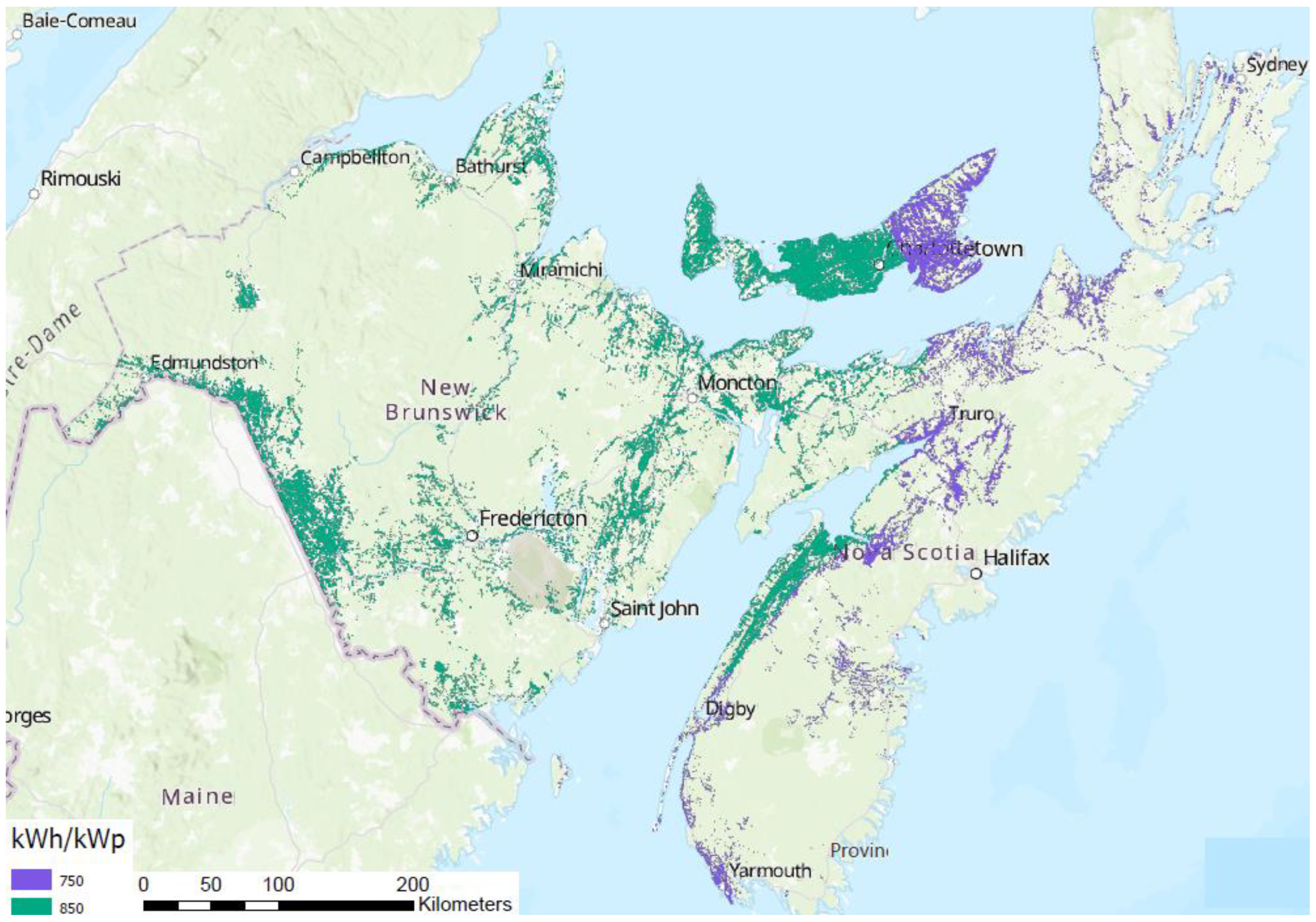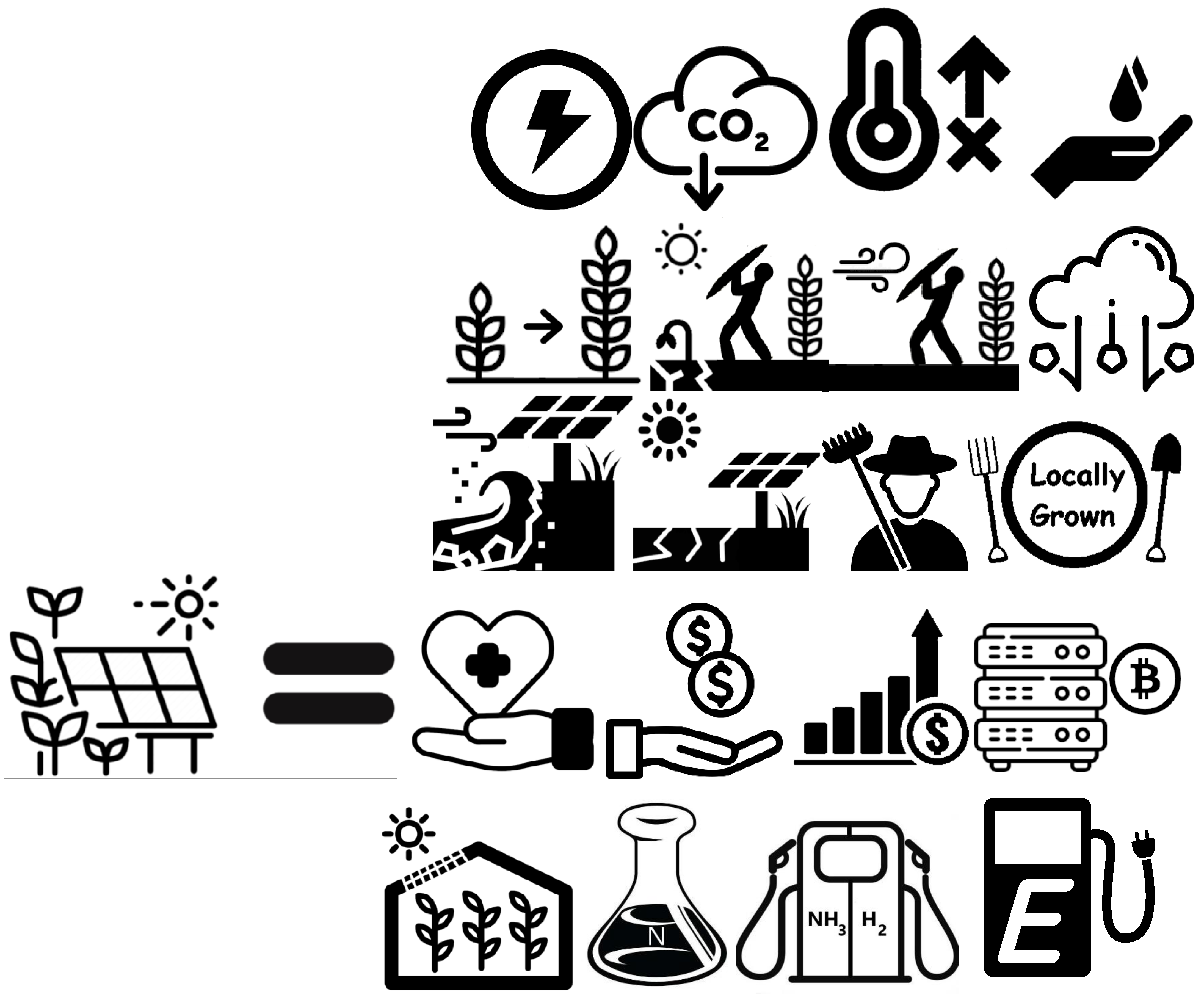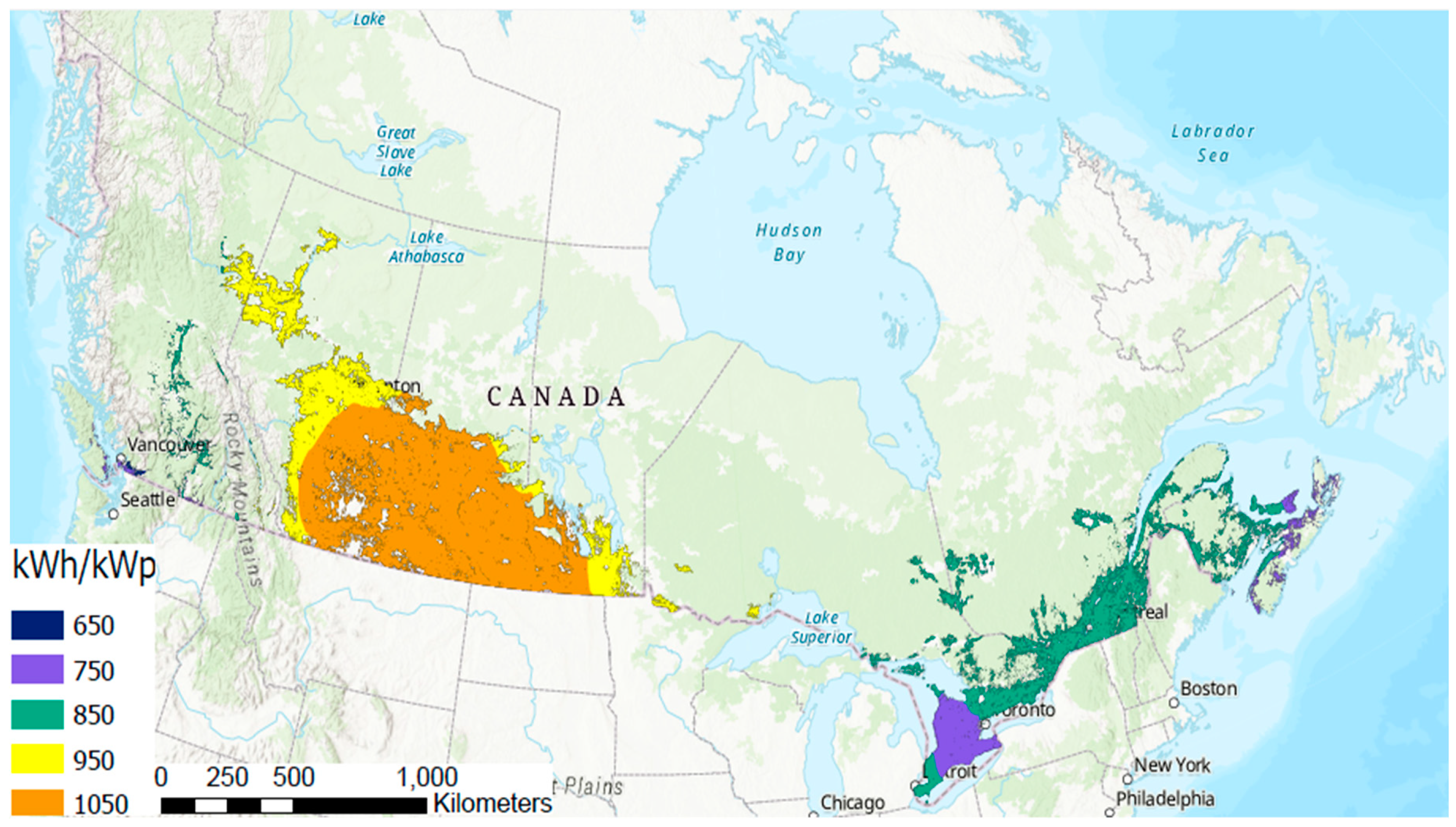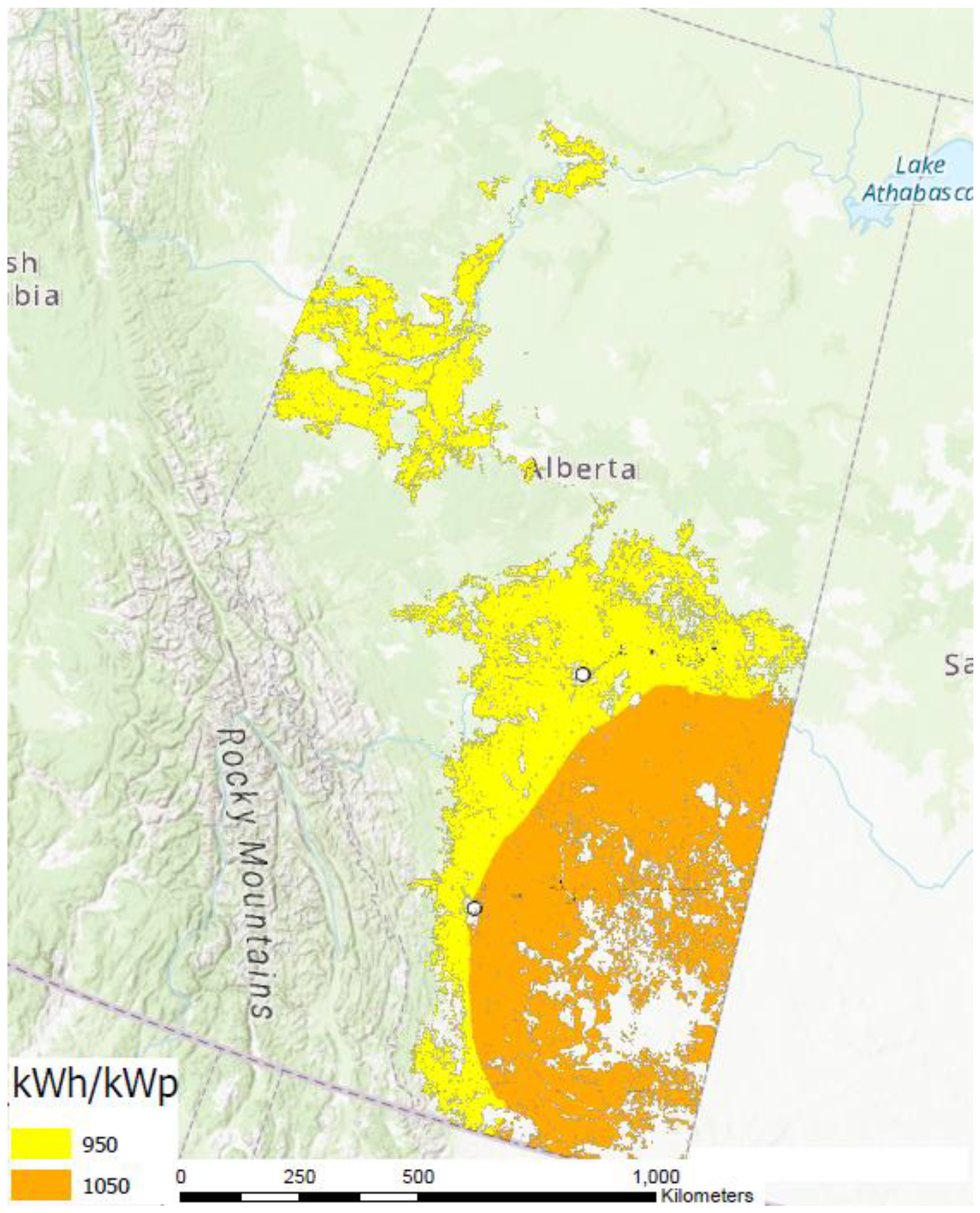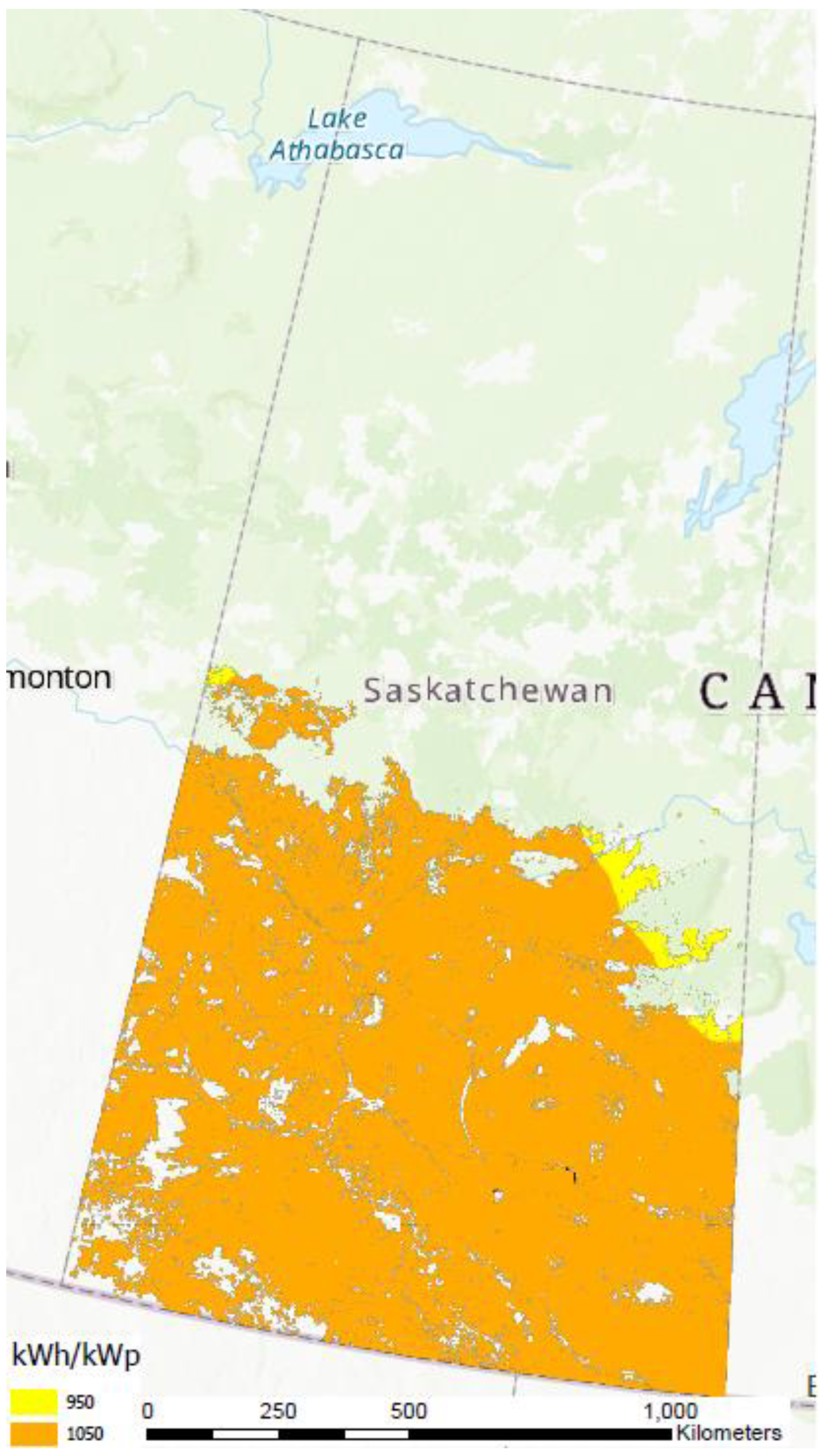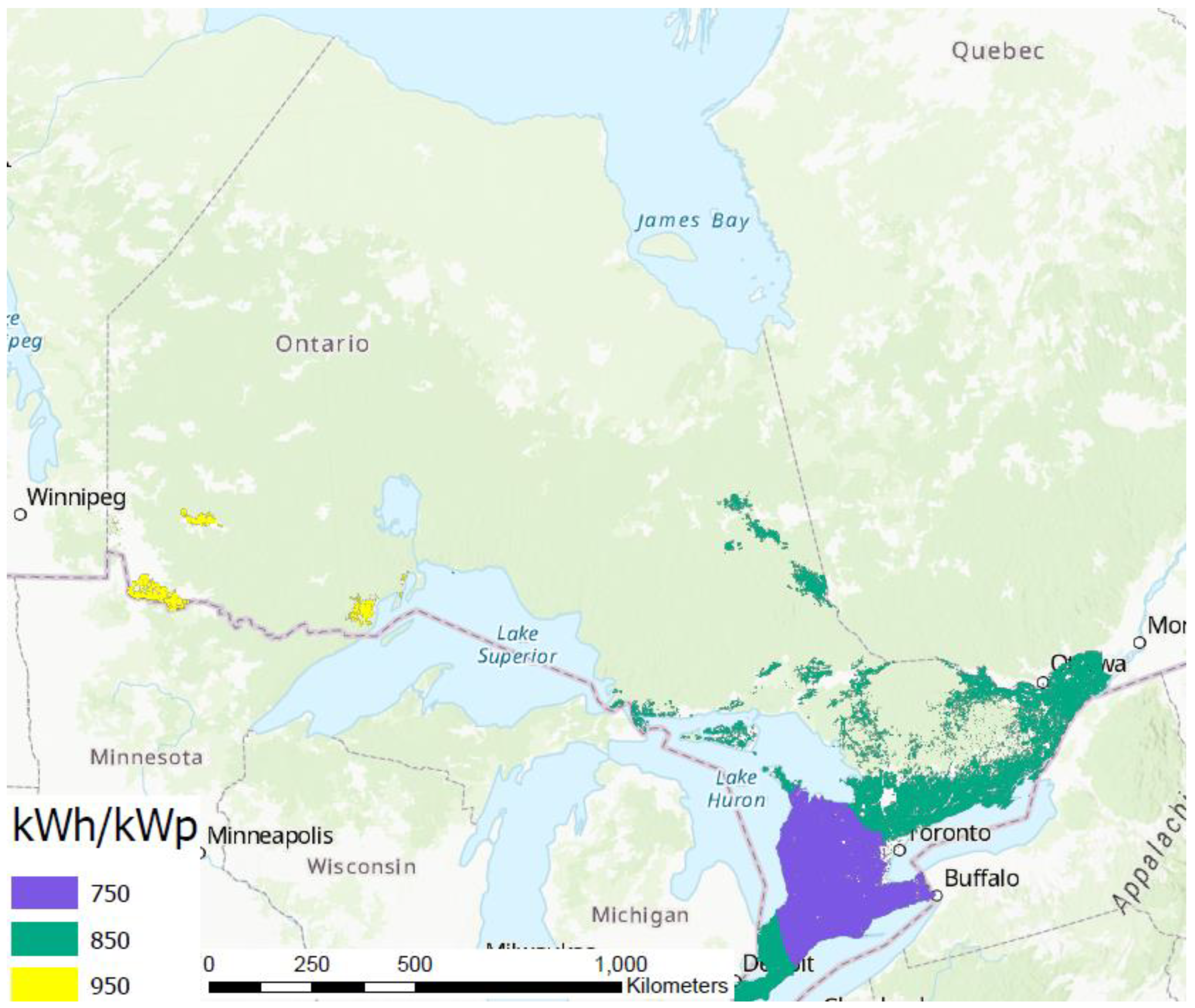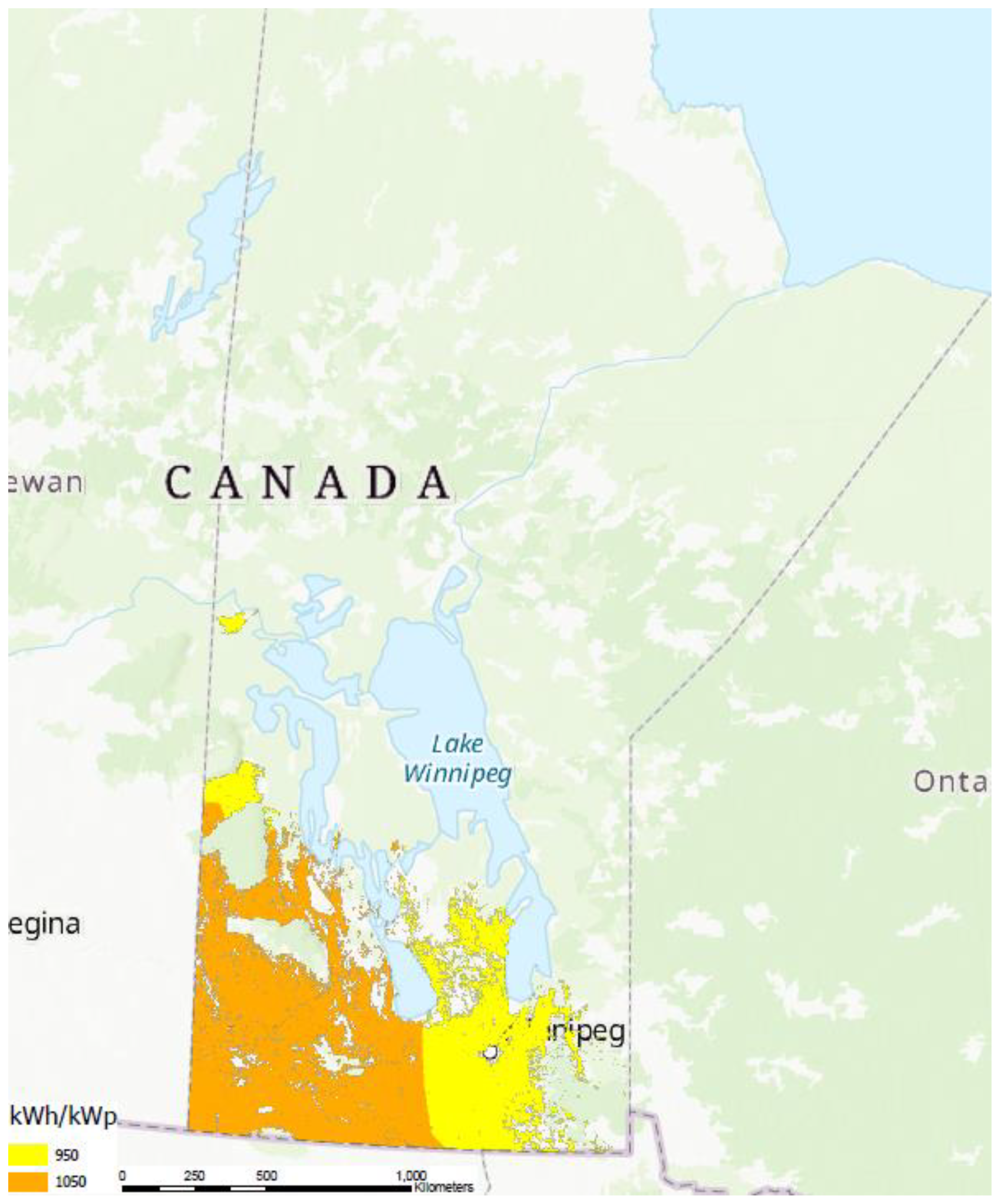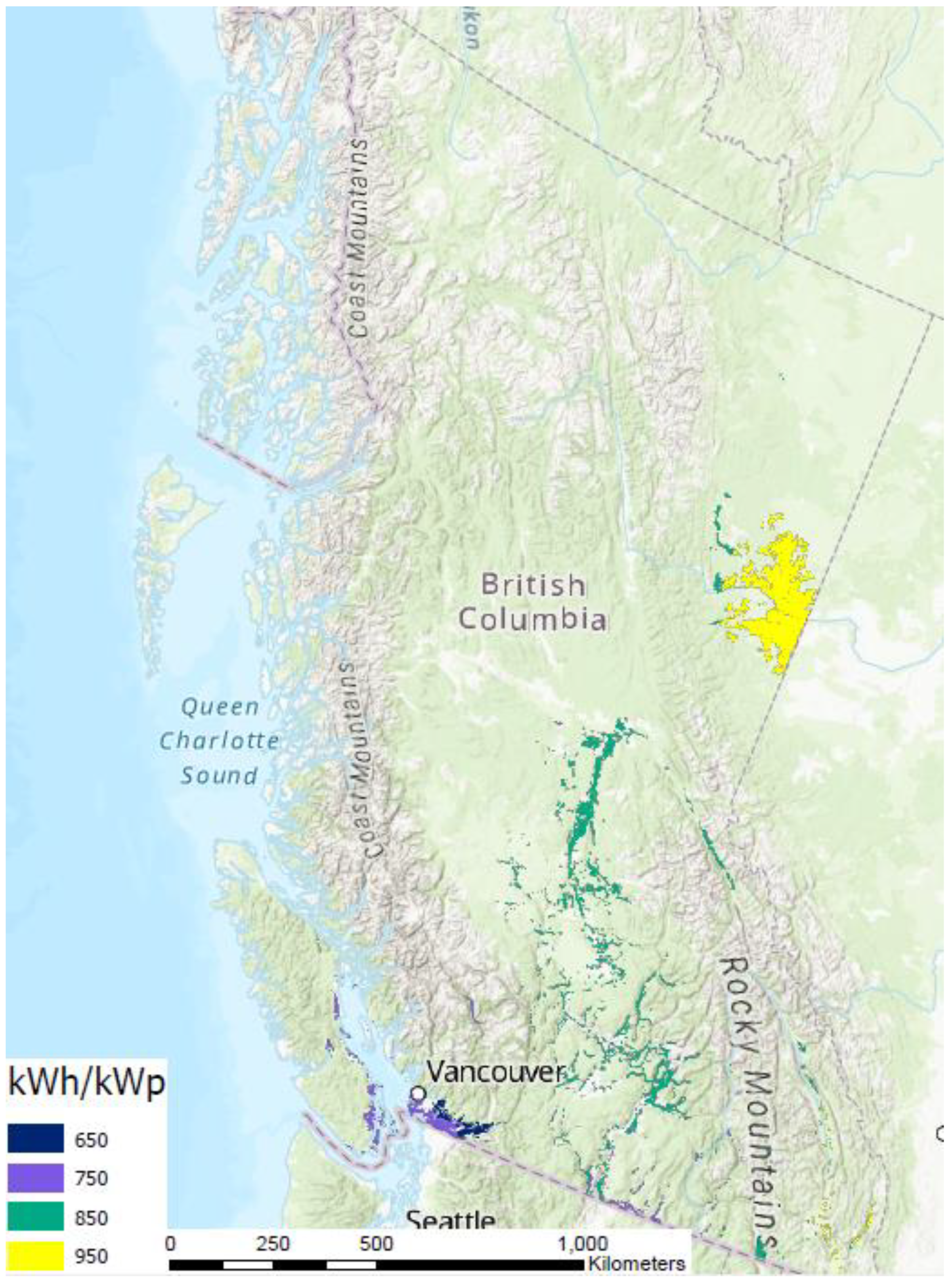1. Introduction
Due to perpetual decline in solar photovoltaic (PV) systems costs [
1,
2], the least expensive source of electricity generation is now solar energy [
3,
4]. The cost reductions have become substantial enough that PV-generated electricity can be used to subsidize heat pumps, which enables the profitable electrification of gas-based heating in Canada [
5]. In addition, the current operational cost of electric vehicles (EVs) warrants electrification of transport [
6], which has the potential to be a major economic engine in Canada [
7,
8,
9]. Lower-cost solar electricity only further incentivizes this transition. Currently, solar based electricity constitutes less than 1% of total electricity generation [
10]; however, there is clearly an economic demand for a massive growth in PV to offset fossil-fuel electricity generation, heating fuel, and transportation fuel.
Residence in cities has increased worldwide [
11], and Canada also has followed this trend with its four largest urban regions (the Calgary-Edmonton corridor, Southern Vancouver Island, Lower Mainland, and the Extended Golden Horseshoe in Ontario) currently comprising more than half (51%) of the population [
12]. As the cost of PV systems continues to decline, more land is needed for the installation of utility scale PV systems to power densely-populated localities with sustainable electricity. Such PV systems are generally situated in rural agricultural areas [
13]. This has the potential to become an issue with rural residents like those observed with wind power siting conflicts [
14,
15], and thus a steppingstone to conflicts over large-scale PV deployment due to apprehensions of possible impedance of agricultural production [
16,
17,
18,
19,
20]. As the world population continues to increase (1.15%/year) [
21], such land-use conflicts could intensify as the requirement of food production increases [
22]. Historic approaches to convert farmland to a source of energy (i.e. ethanol fuel [
23,
24]) have proven counterproductive as it increased food costs as well as global hunger [
25]. With a population growth rate of 0.86% year [
26], Canada is already under intense pressure to convert farmland into housing [
27,
28]. There is a long list of studies that indicate a solution to the energy-land use issue could be through agrivoltaics: the dual use of land for both electricity generation via solar photovoltaic systems and farming [
29,
30,
31,
32,
33]. An increase in PV systems deployments in Canada is beneficial for both local and global environments as solar energy is a sustainable energy source [
34]. It shows particular promise in Canada when applied as a dual use on agricultural land [
29]. Photovoltaics is a net energy producer, which means the energy consumed during its production is generated multiple times over its warranty lifespan of 25 to 30 years [
35], with its technical lifetime being much longer than this [
36,
37,
38]. The environmental returns become even more favorable as efficiency of PV systems continues its rise [
39] and the energy payback period for PV is now less than a year [
40].
Canada is committed to playing its role in the reduction of greenhouse gases (GHGs) and has committed to increase its share of electricity generation through non-emitting sources to 90% by 2030 [
41]. Agrivoltaics deployment would solve the issue of land use conflicts on agricultural lands and has the potential to substantially reduce national GHG emissions and help Canada move to renewable energy for electricity, heating, and transport. Previous research has quantified the agrivoltaic potential in the province of Ontario [
29] and reviewed agrivoltaic-related policy for the province of Alberta [
42], however, no comprehensive investigation has been made for the sustainable power potential of large-scale agrivoltaics deployment in Canada. To fill that knowledge gap, this paper first reviews the benefits of agrivoltaics and previous agrivoltaic crop studies that could be relevant to Canada. Then, it quantifies the potential of agrivoltaics in Canada. Geographic information systems (GIS) analysis of farming areas in each province of Canada is integrated with PV simulations to achieve this. Sensitivity runs are performed for vertical-mounted and single axis tracking PV systems. Energy output aggregated for each province and territory through agrivoltaics is compared with current electricity requirement in Canada. Finally, methods to enable large-scale agrivoltaics are reviewed from policy pathways identified globally.
2. Agrivoltaics Benefits
Agrivoltaics provides multiple benefits and services, which are summarized in
Figure 1.
The first two agrivoltaic benefits come directly from the fact that PV systems generate renewable electricity and that when this green electricity offsets fossil-fuel-generated electricity, GHG emissions are reduced [
43]. This in turn reduces global climate change and the long list of adverse effects on the environment and the economy [
44]. Agrivoltaics also has the potential to benefit water systems by improving farm water efficiency and water conservation [
45,
46,
47,
48]. Agrivoltaic arrays can be used to power both drip irrigation [
49], which is far more efficient than spraying, and vertical growing [
50], which uses a fraction of the water of field-based crops.
Most importantly, many studies show agrivoltaics increases crop yield for a wide variety of crops, which include:
Due to the modest or even substantial positive impacts on yield of the wide variety of crops summarized above, the land use efficiency increases for agrivoltaics over side-by-side farming and PV [
63], and thus, the land productivity could increase by 35–73% globally [
64]. Agrivoltaic arrays create microclimates beneath the PV modules that alter air temperature, relative humidity, wind speed and direction, and soil moisture [
61]. This microclimate is often beneficial to crops because the PV acts as a shield to protect crops from excess solar energy. Agrivoltaic systems also acts as wind shields and protect plants/cultivars from heavy wind loads [
65]. This same PV-shield concept can protect crops from hail, while simultaneously increasing PV performance due to lower operating temperatures created by the crops beneath the modules [
30,
54,
66]. Agrivoltaic microclimates also can mitigate soil erosion [
67] and can even be used to rehabilitate deserts to grow plants in deserts [
68] and barren land [
67].
Agrivoltaics, when designed appropriately, can minimize agricultural displacement for energy [
33,
64,
69]. It maintains local agricultural employment and continues to enable local food production that provides the environmental and health benefits of reducing the distance food travels [
70,
71,
72,
73]. Along with the known health benefits from fresh food, agrivoltaics decreases the many health problems associated with fossil-fuel combustion by displacing these fuels [
73]. Thus, agrivoltaics can both directly and indirectly improve human health and prevent premature deaths [
74]. Agrivoltaics also helps to mitigate Scope 1, 2, and 3 emissions [
75]. Scope 1 emissions reduction is due to reduced travel/commute of products that traditionally need to be remotely produced and brought on to farms for cultivation such as fuel, electricity, and fertilizers – agrivoltaics enables on-farm production of these products. Scope 2 emissions reduction is achieved as farming operations can use electric vehicles which can be charged from electricity generated on-farm via agrivoltaic technology. The same electricity can be used for other farming operations. Scope 3 emissions reduction is possible if electric vehicles are used to transport the produce from farm which can again be charged using on-farm generated electricity. Agrivoltaics also increases the crop revenue for a given acre [
76], which can help farmers economically. In addition, as PV is a capital asset that generates value which increases with inflation, it can be viewed as a financial means to hedge inflation during times of high inflation (e.g., 2021 and 2022) [
77]. Agrivoltaics can be coupled to large loads from computing facilities such as those running AI, server farms and cryptocurrency miners [
78]. There is a particularly good potential symbiosis between server waste heat, greenhouses, and agrivoltaics for powering both systems [
79]. Partially transparent PV can be integrated into greenhouse glazing itself, providing further coupling between solar electricity generation and food production [
80,
81,
82].
Agrivoltaic-generated electricity can also be used to provide direct farm inputs such as on-farm production of nitrogen fertilizer [
83] and renewable fuels like anhydrous ammonia [
84] or hydrogen [
85,
86,
87]. Agrivoltaics can be used for EV charging for on-farm use or to sell as a commodity, particularly if a farm is located next to a major road that is appropriate for an EV charging park, which in turn would help to accelerate the electrification of transport by reducing range anxiety.
Agrivoltaic systems are appropriate over a vast array of different scales. Generally, agrivoltaics are considered for large-scale (utility-scale) applications; however, even for a home planter, parametric open-source cold-frame agrivoltaic systems are feasible [
88]. The technology can operate with a variety of shade tolerance in crops. For instance, full array density PV modules work well with shade tolerant crops, while less dense PV systems are favorable for shade intolerant crops [
89]. East/West facing vertical bifacial photovoltaics can be a preferred scheme for agrivoltaics with field crops using conventional farm equipment [
89]. By increasing the installation height of PV arrays, more irradiance and bifacial gain is observed for bifacial modules [
90]. Another advantage of elevating the height of PV panels is the ease of operation of agricultural machinery. Increasing inter-row spacing between modules benefits ground irradiation; however, it also reduces electrical output for a given area [
90]. With agrivoltaics row spacing greater than conventional PV farms the capacity factor would be increased due to freer air flow resulting in lower operating temperatures as well as a radically reduced row-to-row shading. A small increase in the DC losses would be expected because of longer cable lengths, but overall the agrivoltaics system would provide economic advantages be enabling more land to be used in total. South facing systems are beneficial for farming shade tolerant crops during the summer, whereas east-west vertical arrays are beneficial during non-summer seasons and are hence advantageous for permanent crops (e.g., species that are harvested over many seasons like grapes) [
90].
Agrivoltaics technology is already used in Canada with projects such as the Arnprio tri-part agrivoltaics which includes a monarch butterfly conservation subproject, a bee and honey production subproject, and a solar grazing and natural weed cutting subproject [
91]. At present, most agrivoltaics systems employed in Canada consist of traditional solar PV farms, which are also used for grazing sheep. Such systems are beneficial for the sheep as they provide thermal protection [
92] and improved quality grazing areas [
93], as well as for the PV systems as the sheep alleviate the cost of weed removal. Life cycle analysis of such agrivoltaic sheep operations show that they are environmentally beneficial [
94], but fail to reach the full potential of agrivoltaics that are designed around crop production.
Unfortunately, Canada is behind Europe, Asia, and the U.S. in agrivoltaic deployments. Countries that are more aggressive in adopting agrivoltaics are expected to gain a competitive advantage due to the benefits outlined in
Figure 1. Being the fifth largest agricultural exporter globally [
95], Canada’s motivation to keep up with novel agricultural technologies is high. As PV-generated electricity is already a low-cost option (i.e., Alberta PV is currently at CAD
$47/MWh for a power purchase agreement (PPA) [
96]) and agrivoltaics has all the benefits summarized in
Figure 1, future utility-scale PV installations in Canada could favor agrivoltaics. The remainder of this article will determine the potential for agrivoltaics in Canada if such a policy were to be pursued.
3. Materials and Methods
The study is carried out to determine agrivoltaics potential in Canada using 1% of the existing available farmland in Canada. First, the total solar potential across Canada was determined using a vector dataset that estimates photovoltaic potential (in kWh/kWp) of south-facing, vertically oriented arrays across the country [
97]. From this layer, the area representing the cropland in each province (Ontario, Alberta, Saskatchewan, Manitoba, British Columbia, Quebec, and the Maritimes combined) was extracted based on the 2015 Land Cover of Canada 30 m spatial resolution raster dataset [
98]. ArcGIS Pro 2.9.0 with the Spatial Analyst toolbox was used to achieve this. It should be pointed out that “pastureland” was excluded from the dataset although it could increase the agrivoltaic potential of Canada further. This consideration is left for future work. The total conventional PV potential-area for each province was then determined from the area of the cropland raster cells and average PV potential of each.
Locations in each major solar flux grouping were used to model agrivoltaic systems in the opensource System Advisor Model 2022 (SAM) [
100] using Heliene 144HC-460 bifacial PV modules [
101]. One percent of agricultural land was calculated for each province in Canada as the area of interest. To determine the configuration of PV systems in this piece of land, the area was considered as a square and length of one side was calculated by taking the square root. Two distinct agrivoltaics systems are considered for the analysis: 1) vertical (south-facing, tilt 90°) and 2) single axis tracking (horizontal, Tilt 0° – which is the default setting in SAM for single axis tracking modelling). The design of a single array of vertical PV takes up a width of 4.8m with an installed PV capacity of 2,700 W [
102]. The design of a single array of single axis tracking system takes a width of 23 m and depth of 4 m with an installed PV panel capacity of 15,000 W [
103].
The length of one side of square land area is divided by the width of array (4.8 m for a vertical system and 23 m for a single axis tracking system) to determine the total number of arrays in one row. To calculate the number of rows on the piece of land, the length of one side is divided by 20 m for both systems to ensure sufficient distance for farm equipment mobility – the inter-row spacing considered for agrivoltaics system. Once the number of rows is ascertained, then using the number of vertical and single axis tracking arrays in a single row, the total number of arrays in an area is determined. Next, the product of total number of arrays and installed PV capacity on a single array (2,700 W for vertical system and 15,000 W for single axis tracking system) provides the total installed PV capacity on the agricultural land. The following locations were chosen for each province based on the energy yield potentials from GIS analysis.
Ontario (London, Chatham, Gameland)
Alberta (Edmonton, Drumheller)
Saskatchewan (Northern Pine, Regina)
Manitoba (Winnipeg, Brandon)
British Columbia (Richmond, Dawson Creek)
Quebec (Sherbrooke)
Maritimes (Cardigan, Glasgow)
Next, the cities inside each province that match those potentials were identified and selected for SAM analysis. British Columbia was an exception. Richmond was selected for energy yields of 650 kWh/kWp, 750 kWh/kWp and 850 kWh/kWp as there was no identified location close to the areas of energy yield potentials of 650 kWh/kWp and 850 kWh/kWp to use in British Colombia. Richmond has an average energy yield potential of 750 kWh/kWp, which is the average for the region.
Using these locations, SAM models (
Table 1) were developed to determine annual energy yield for one kW of PV system for both the configurations. Finally, using the total installed capacity for an area and annual energy yield of the system, the total AV potential of the location was determined.
5. Discussion
From SAM models and simulations, it is estimated that potential annual energy output by employing agrivoltaics to 1% of agricultural land is 175,267 GWh for vertical systems or 272,554 GWh for single axis tracking systems in Canada.
Table 10 summarizes the electricity generation potential of agrivoltaics installation on 1% of agricultural land within the provinces of Canada.
Canada’s total electrical energy production in 2019 was 632,200 GWh [
114]. Thus, about a 28% to 43 of Canada's electric needs can be catered from vertical bifacial or single axis trackers agrivoltaics systems, respectively. Considering Canada’s targets for renewable energy generation and reduced GHGs, agrivoltaics technology manifest immense potential.
Table 11 summarizes the percentage of agricultural land on which agrivoltaics needs to be deployed to eliminate fossil fuel-based electricity generation in Canada.
The study provides an in-depth evaluation of agrivoltaics potential in each province of Canada. The results could be used to formalize future policies and regulations which will then help unlock the technology’s full potential.
5.1. Limitations
Although this investigation demonstrates capabilities of agrivoltaics technology in Canada, there are limitations to this study. Firstly, there is a need to experiment with on-ground agrivoltaics systems that provide experimental evidence as to both the electrical output and the performance of crops under the system. Thus, future work is required to translate simulations and models-based study into practical applications. Moreover, there are several agrivoltaics configurations that need to be studied (for instance, vertical bifacial, single and double axis tracking, fixed and variable tilt, stilt mounted systems or conventional systems etc.) with a variety of crops.
Currently, little research focuses on the quality of crops that will be harvested under agrivoltaics. Hence, detailed investigation is required to determine if agricultural produce via agrivoltaics improves or deteriorates the nutrient profile. Moreover, social acceptance of the technology is key to its diffusion on commercial scale. Hence, studies are required which focus on people’s perceptions (and misconceptions) about the technology and seek feedback from the main stakeholders which will promote its adoption on mass-scale. Such studies will serve as a foreground to come up with financial models which help farmers, financers, and policy makers to make informed decisions.
5.2. International Competition in Agrivoltaics
Agrivoltaics projects employed in Canada thus far are relatively small in scale and consist primarily of traditional solar PV systems, which are used for livestock grazing. These projects have been shown to be helpful for both sheep grazing (benefits include protection from heat [
92] as well as provision of high-quality grazing land [
93]) and PV systems (advantage include alleviated maintenance costs associated with weed removal etc.), and when combined, to the overall ecosystem/environment as well [
94]. The merits of agrivoltaics technology go far beyond these as can be seen in
Figure 1 and the technology can offer better land-use strategies. Canada needs more aggressive development and advancement in agrivoltaics to keep up with the rest of the world especially Europe, China, Japan and U.S. where the technology is rapidly expanding. In 2012, there was only 5 MW of agrivoltaics systems installed globally; this has expanded to a total global installed capacity reaching 14 GW in 2021 [
115]. In China, the largest agrivoltaic system has an installed capacity of 700 MW, whereas Japan has 1,800 small agrivoltaic systems [
115]. This shows the scale at which agrivoltaic technology has progressed and the flexibility it has with deployment. Moreover, approximately 2,800 MW of agrivoltaics systems have been installed in U.S. [
116]. The U.S. Department of Energy recently approved USD 8 million to support agrivoltaics research and supplement its development [
117]. Canada, being one of the largest exporters of agricultural products [
95], has substantial revenue at stake and needs to consider what appropriate actions are needed to stay competitive with other countries that are both deploying and researching agrivoltaics aggressively.
5.3. Potential use of Agrivoltaic-generated Electricity: Computation, Transportation and Export
As the results in
Table 11 clearly show, augmenting even tiny fractions of the agricultural land in Canada with agrivoltaics would eliminate all carbon emissions from Canada’s electricity generation. This is important as Canada’s per capita historic GHG emissions are the highest in the world [
118] and the existence of the new agreement on “loss and damage fund” [
119,
120] can make further emissions a major liability, Canada should be aggressively seeking to reduce carbon emissions liabilities [
121,
122,
123,
124]. It is also clear that the agrivoltaic potential of all the provinces far exceeds what is needed to decarbonize the electric system (
Table 11). There are several applications of low-cost sustainable electricity generation that would benefit from a large influx of agrivoltaics deployments in Canada: i) decarbonize transportation by moving to electric vehicles [
125,
126] and hydrogen fuel (e.g. a hub and spoke collection system developed by dairy producers can be mirrored by hub and spoke on-farm hydrogen production by agrivoltaics [
127]; ii) decarbonizing heating using heat pumps that are already economic in Canada [
5], iii) powering increased computing operations [
78,
128,
129] and iv) exporting electricity to the fossil-fuel dependent U.S. [
130].
